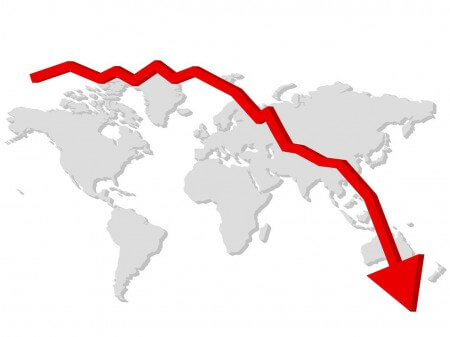How Likely is a Global Recession in 2020?

Since the start of the year, when governments realised that the coronavirus would not be contained to China, many predicted that the knock-on economic impact would lead to a global recession. Compound this with the discordancy of the economic situation as it stood, the fight to curb environmental impacts, and the resultant oil price war, it seems a perfect cocktail for economic unrest. With the last major financial crisis fresh in our collective memory and many countries still feeling the effects of it, what are the chances of a global recession in 2020?
How Will the Coronavirus Impact the Economy?
Coronavirus (COVID-19) and its implications – such as the lockdown of entire countries and the closure of many industries – would be the obvious catalyst of a ‘short, sharp' recession, according to experts. Italy's most prosperous region, the north, has been hit particularly hard with the virus, affecting their economic prospects, while the sluggish response from the USA and UK are storing up trouble for tomorrow with many in the workforce expected to get ill. Add to this the precipitous price war over oil and the ingredients are primed for a global recession.
PIMCO global economic advisor Joachim Fels posits that the possibility for recession in the USA and Europe is ‘distinct', with Japan already there. China's normally robust economy has seen the first dip during February since the 1970s, with the domino effect of the slowdown of industry affecting the rest of the world. Some estimate that while a sharp recession will occur, it will hopefully be short. Unlike the 2008 financial crisis, a recession caused by COVID-19 has a simpler cause – production has halted. So, if we are hit with a global recession, economists could navigate our way out of it.
The DOW Jones saw its sharpest decline since the 1980s as the industrial average fell 10%. The US Federal Reserve offered a cash boost of $1 trillion for the ailing markets. This helped, but experts say that there needs to be more to prevent a full-scale collapse. Unlike the 2008 crash, there are still areas of the economy doing well, which could help to keep it afloat for longer. There are ways in which we can follow any potential changes in the economy aside from the DOW Jones, which might not be the most comprehensive metric when faced with a range of other issues.
Forex trading could show the relative difference between economies' currencies. For instance, the pound hit a low against the dollar and euro in late March 2020, which occurred after the Bank of England slashed its interest rates. These changes in foreign exchange could be useful for those who read the charts. Indeed, budding traders and those interested in following can easily learn how to read forex charts to accurately see the indicators of key trends and price points that signify how well a country is doing – and whether a recession is on the cards.
Global Recession Predicted Regardless of COVID-19
Some suggest a recession was imminent without the international pandemic biting into vast swathes of industry. Many US commentators suggested back in September 2019 that despite no tight monetary policy and no overhang of inventory, trade deals could push for a US and then a global recession. Similarly, in the UK, Brexit and its ramifications could lead to a greater period of economic uncertainty. KPMG suggested that there would be a recession in 2020 as a result of Brexit setting unrealistic goalposts for global trade deals.
The Italian economy was already weakened and has been teetering on the brink of a recession for some time, so the effects of the coronavirus on the country will likely be the final stroke. China was also primed for a period of economic uncertainty as a result of the pension situation, with researchers suggesting that the pension pot would have depleted to such a level in the next decade anyway.
While a global recession may be inevitable once the dust settles from the coronavirus, it is hopefully one that economists can manage. The reasons for the recession will be more clear-cut and once industry gets back on its feet, we should see an improvement. Most forecasters expect a ‘short, sharp' recession, which we will likely take in our stride when the world begins to heal from the pandemic.
839GYLCCC1992




Leave a Reply